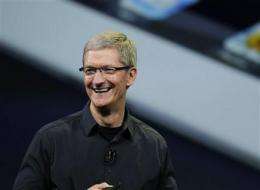Apple CEO Tim Cook emerges from Steve Jobs' shadow

(AP) -- Apple CEO Tim Cook has long seen as the humorless and unemotional guy running the show from behind the scenes. But he is beginning to reveal a more assertive and eloquent side, hinting that he's learning to shoulder more of Steve Jobs' role as a front man and leader.
On a conference call with journalists and financial analysts late Tuesday, Cook showed some fire when talking about competitors, echoing the combative Jobs. He also spouted a vivid metaphor that spread like wildfire over Twitter before the call was over.
Most Apple watchers have sized up Cook as a competent caretaker of the machine that Apple founder and late CEO Steve Jobs created, but if Cook has latent charisma that can be thawed out further, he may turn into the kind of leader some people think is essential for the company.
In a blog post Wednesday, George Colony, the CEO of Forrester Research, predicted that Apple Inc. will go the way of Sony, fading away now that Jobs is not around to inspire.
"Without the arrival of a new charismatic leader it will move from being a great company to being a good company," he wrote.
Even while Jobs was alive, Cook handled appearances in front of Wall Street analysts. He spoke precisely and calmly, and his language wasn't very quotable. At a Goldman Sachs investors meeting in February, for instance, he said "our high order bit is we want to please customers." A "high order bit" is a computer science term for the most important piece of data in a set.
But on Tuesday, when asked if PCs and tablets might someday blend into one device, like rival PC manufacturers hope, Cook extemporized this response:
"I think anything can be forced to converge. The problem is that products are about tradeoffs, and you begin to make tradeoffs to the point where what you have left at the end of the day doesn't please anyone. You can converge a toaster and a refrigerator, but those things are probably not going to be pleasing to the user."
The "toaster fridge combo" phrase zoomed around Twitter, and within minutes, someone created a "FridgeToaster" account that started talking back at Cook.
Microsoft spokesman Frank Shaw tweeted that Windows 8, the new software that's supposed to bridge tablets and PCs, is "not a toaster/fridge. It's a toaster/oven. Those seem pretty popular. Just saying."
Cook's attack was reminiscent of an appearance by Jobs on a conference call in October 2010, in which he lambasted the idea of tablets smaller than the iPad. Competitor Samsung Electronics was set to launch a small tablet, in the first real challenge to the iPad. Jobs said 7-inch screens were so small that owners would need to file down their fingers with sandpaper to hit buttons accurately.
Later in Tuesday's call, Cook was asked if he'd consider settling some of the patent lawsuits the company is waging against competitors. Apple accuses Samsung and Motorola of copying its iPhone and iPad. Again, Cook revealed some emotion.
"You know, I've always hated litigation and I continue to hate it. We just want people to invent their own stuff," he said.
Carmine Gallo, a communications coach and the author of several books about Apple, says that while it's clear Cook is a much less emotive communicator than Jobs, he could become an effective one.
"Remember, Steve Jobs' stage presence was honed over decades of trying to improve his style and his communications skills. The Steve Jobs of the mid-70s -and there are video tapes of him- was not nearly as polished and charismatic as the Steve Jobs that we knew until last year," Gallo said.
One thing Cook does very well, Gallo said, is that when he presents a number he wants listeners to care about, he puts it into a meaningful context.
For example, when Cook wanted to convince the audience at a 2010 event that the Mac business is still very important to Apple, even though iPhones make a lot more money, he didn't just say that it makes $22 billion a year. Cook added that if it was a standalone company, the Mac business would be number 110 on the Fortune 500 list.
"I thought `What a brilliant technique!'" Gallo said. "He does that all the time."
But most importantly, Gallo said, it's evident that Cook cares deeply about Apple.
"You can't teach passion. Every great communicator is abundantly passionate about -not necessarily the product- but what the product means to society. And that is an attitude that pervades Apple's executive office, and it starts with Tim Cook," he said.
Cook revealed some of that passion at the February conference. Toward the end of the talk, he said there was "no better thrill" for him than going to a gym or to Starbucks and seeing people using their iPhones or iPads.
"These are the things that bring a smile to my face, and there is no replacement or substitute for that," Cook said.
©2012 The Associated Press. All rights reserved. This material may not be published, broadcast, rewritten or redistributed.



















